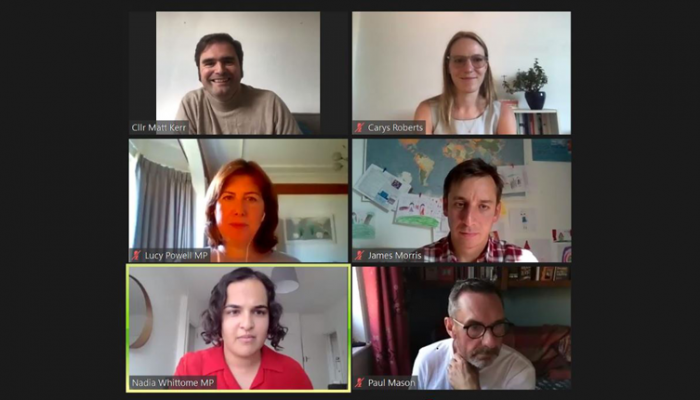Labour’s long, hard road back to Number 10
The thinktank IPPR hosted a fringe event at Labour Connected, the party’s virtual conference on 20 September asking how Labour can rebuild a winning coalition of voters in order to regain power at the next election.
Carys Roberts, the Chief Executive of IPPR, chaired the event and said that clearly a future winning coalition would look different to previous ones in 1997, 2001 and 2005. She acknowledged the road back to power for Labour ‘looks challenging’ after the heavy defeat of 2019.
Lucy Powell reflected on the report into the 2019 election defeat that she put together with help from Ed Miliband and many others across the Labour party. She recognised the report needed to ‘look to the future and learn lessons from the past’ and she also stressed how important it was to do this work, given no analysis was done of the three previous Labour General Election defeats in 2010, 2015 or 2017.
Reflecting on the historic 2019 defeat for Labour, Lucy Powell said 2019 had been a very low point for the party in terms of Brexit, its then leadership under Jeremy Corbyn and a manifesto that wasn’t widely seen as an effective document. She said the crumbling of the red wall heartlands constituencies, however, had been ‘a long time coming’ given changes within the party and its policies over time. She also said that in 2019 the Conservatives managed to turn out two million more non-voters that Labour which had a significant impact on the result.
The report highlights several routes back for Labour which include a clear focus on immigration to win back the red wall seats; a credible centre-left economic package of measures similar to the party’s 1997 manifesto or an ambition for Labour to be the agents of change in difficult economic circumstances. She concluded the latter option was by far the best for the party and added: ‘We have to be the party at next General Election of big economic change’ and this meant in the workplace as well as in the community.
Nadia Whittome said the party had great policies within its 2019 manifesto but it didn’t have a narrative tying everything together. She also said the party was always going to struggle in an election fought solely on Brexit, but added the party lost more votes to the Greens and the Lib Dems than it did to the Conservatives.
Ms Whittome recognised the importance for the party of regaining seats across the UK from Scotland to Swindon and said deindustrialised towns were key to whether the party will win power again or not. She warned against a global right-wing media stoking fear of others, but also added some manifesto policies that were perceived to be too radical in 2019 would now, in light of Covid, be seen as not radical enough.
Matt Kerr, a Glasgow City councillor reflected on the situation in his city where some of Labour’s safest constituencies ‘fell like dominoes’ to the SNP in 2015. He reflected that though the party made progress in Scotland in 2017 it was reversed in 2019. Kerr warned that Labour took post-industrial communities for granted or failed to tackle the fundamentals that were eroded under successive Conservative Governments.
He warned the party to take note of the 2019 defeat and change as he said Scottish Labour was still suffering after its 2007 defeat to the SNP. He urged ‘fight hard now and don’t let them [the Conservatives] dig in’. While he opposed Scottish independence, he said the party need to face up to a bigger question about it not least because 40% of Scottish Labour voters moved to the SNP in 2015 and have not come back to the Labour fold.
Paul Mason said the party needed to change its strategy and its economic agenda. He also said that if it was clear before the next election that the party is unlikely to gain 123 seats required to form a Government, then it need to embrace working with other opposition parties in terms of electoral pacts.
Paul Mason reflected on the differences between Holborn in London and Wigan in the North West. These were two very different types of working-class communities and said Labour still needed to explain the benefits of immigration in poorer communities outside London.
Mason also said that the party was on the backfoot in terms of its media presence and the dominance of the Conservative leaning press. He said the party should address this and noted currently the ‘heavy lifting’ in terms of publicising Labour’s campaign messaging was being done by fringe outlets like Skwawkbox and Novara Media.
In terms of policies that the party needs to win an election, Paul Mason said they need to be ‘substantial’ to make someone vote Labour and not Conservative. He added that ‘Water nationalisation not a big enough issue to make people change sides.’
James Morris, a former adviser to Ed Miliband said that given Keir Starmer inherited a ‘tarnished brand’ from his predecessor only months ago, the fact the party is already level with the Conservatives in some polls shows major progress has been made already. He also urged the party to once again embrace people who were left leaning economically but right leaning on culture and identity, in order to win a majority again.
Morris said the media doesn’t focus on Conservative credibility in the same way as Labour credibility, given the lack of criticism for Boris Johnson’s £100 billion ‘Moonshot’ idea. He added that the party had to focus on winning and worry less about policies that are of little interest to most of the public at this stage in the electoral cycle. He concluded that with a new leader in post, the party now needed to begin to establish its agenda and build trust with the public in order to stand any chance of winning in 2024.





Leave a Comment